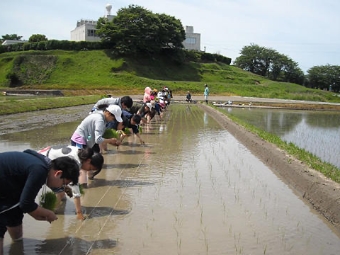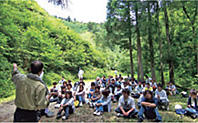Graduate School of Agriculture
Fostering advanced engineers and researchers who will contribute to building a sustainable society
The Graduate School of Agricultural Science aims to develop advanced expertise and technology in the development of biological production technology and the stable supply of safe and secure food, the elucidation of biological functions and the utilization of biological resources, and the creation, restoration, conservation, management and utilization of the biological environment. The Graduate School of Agricultural Sciences aims to foster advanced technicians and researchers who can solve various problems related to food, life, and the environment from regional and international perspectives, and who can contribute to building a sustainable society that coexists in harmony with nature. We are also actively working on the SDGs (Sustainable Development Goals) set forth by the United Nations.
Major and Course Outline
Department of Food Production
The Department of Food Production provides more advanced specialized education in agricultural production, plant factories, agricultural management, and fisheries, to acquire basic knowledge related to food production, a bird’s-eye view, and comprehensive thinking skills. In addition, students will take lectures and practical training courses in specialized fields such as agricultural production, plant factory systems, food management, and fisheries, to acquire more practical and advanced specialized knowledge and skills, as well as general abilities that encompass all of the above. The educational content of this major is based on biology, which is the basis of agriculture and fisheries science, and is supplemented by advanced engineering technology and social science knowledge and methods, thus becoming a comprehensive science that integrates the humanities and sciences and covers a wide range of agricultural and food production. This will result in a comprehensive science that integrates the humanities and sciences related to agriculture and food production.

Department of Bioscience and Biotechnology
The Department of Bioscience and Biotechnology conducts education and research, from basic to applied, on the chemical elucidation of biological phenomena occurring in various organisms and their constituent cells, and the physiological functions of bio-molecules, including food components, based on the knowledge cultivated in the undergraduate curriculum. In addition, students will acquire practical and advanced specialized knowledge and skills by taking seminar and practical training courses, as well as general abilities that encompass all of the above. In addition to the Applied Biochemistry Course, the Department has a Special Course in Health Functional Nutritional Science, which specializes in food and health in the field of biofunctional studies, and is characterized by an interdisciplinary educational system based on collaboration between medicine and agriculture, and by conducting advanced education and research on food and health in cooperation with the Research Center for Food and Health Science, Faculty of Agriculture. The university will also establish a special course of nutritional science for health function and nutritional science.

Department of Biological and Environmental Studies
The Department of Bio-Environmental Studies is characterized by providing education that enables students to acquire advanced specialized knowledge and skills, to understand a variety of cutting-edge research related to bio-environmental studies, and to acquire presentation skills to disseminate the results of their research widely. Specifically, the Forest Resources Course, Forest Environmental Management Subcourse, Biomass Resources Course, Regional Environmental Engineering Course, Environmental Conservation Course, and Water Environment Restoration Science Special Course provide education related to the most advanced science and technology in each field, while also offering field training (internship) based on the course co-curricular system. In addition, the program also includes field training (internship), training debriefing sessions, research presentations (interim and final presentations), and so on. The program also provides field training (internship) through co-curricular courses, practical training reports, and research presentations (mid-term and final presentations).

Special Course for Working People
Research guidance” in the Special Course for Working Adults is organized under a flexible guidance system that employs a system of primary and secondary supervisors and a “special seminar” and “special experiment” according to the student’s research theme.
In addition, “lectures” are flexibly combined with short-term intensive classes, evening classes, and correspondence classes, etc., which are offered in accordance with the special exceptions for educational methods stipulated in Article 14 of the Standards for the Establishment of Graduate Schools, depending on the work schedule of students who are working adults.
Asia, Africa and Pacific Rim Special Course
The Asia, Africa, and the Pacific Rim Special Course is designed to nurture global leaders, with all classes and research instruction conducted in English. The Special Course aims to nurture global leaders with a global perspective by offering a variety of educational programs that take advantage of Shikoku’s geographical location as an academic research field in various fields related to agriculture and marine science, including global population growth, climate change, environmental destruction, and the collapse of biodiversity. The objective of the program is to develop global leaders who have a global perspective and can play an active role.

